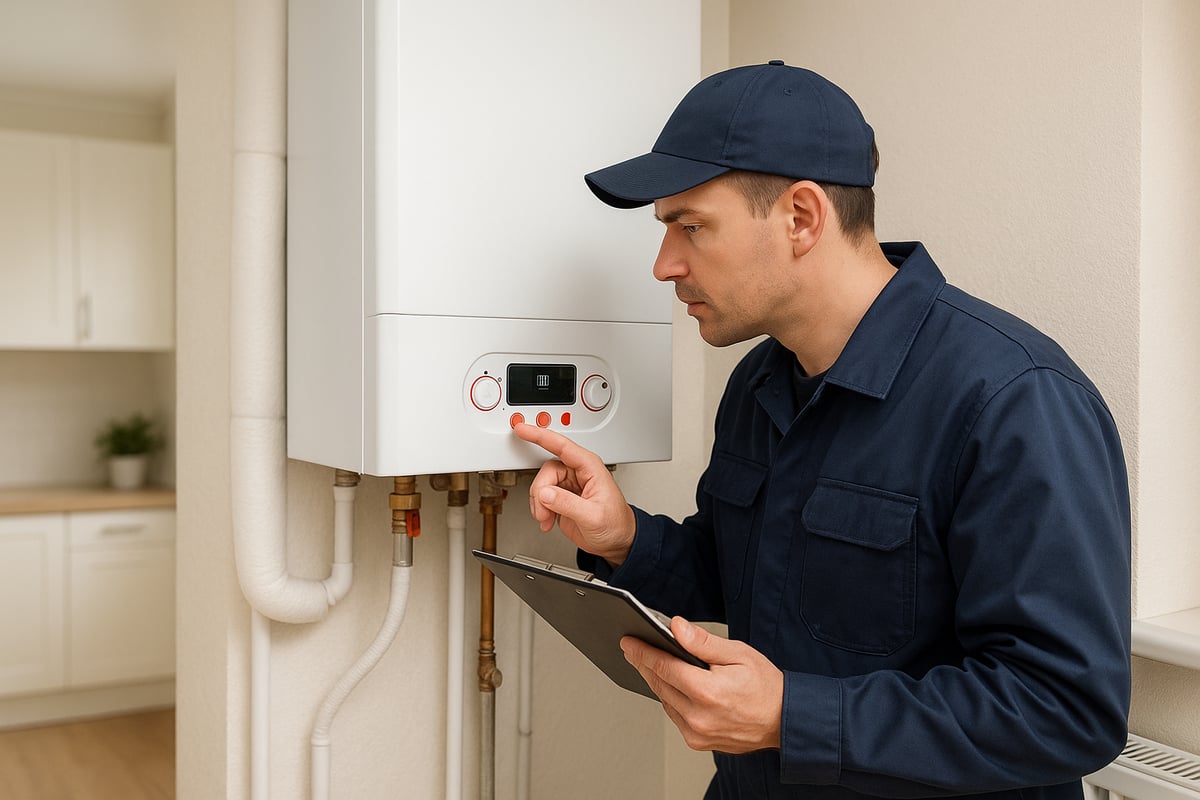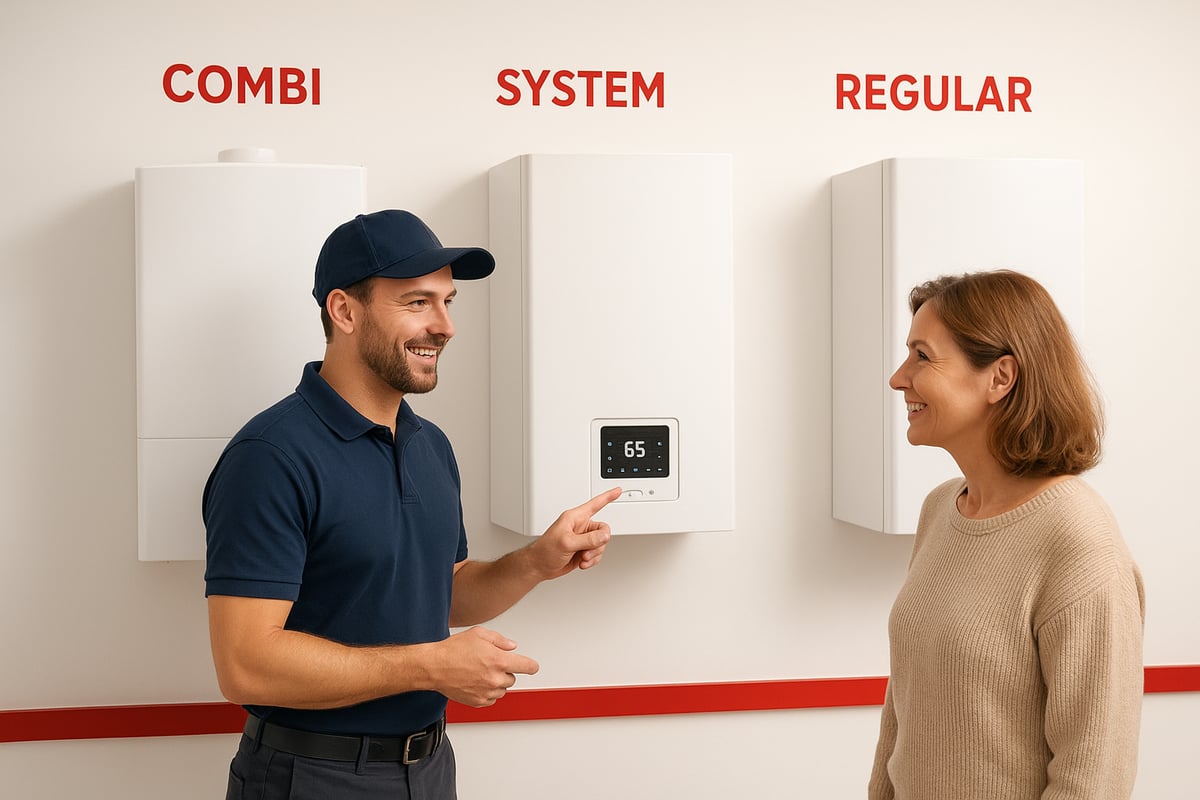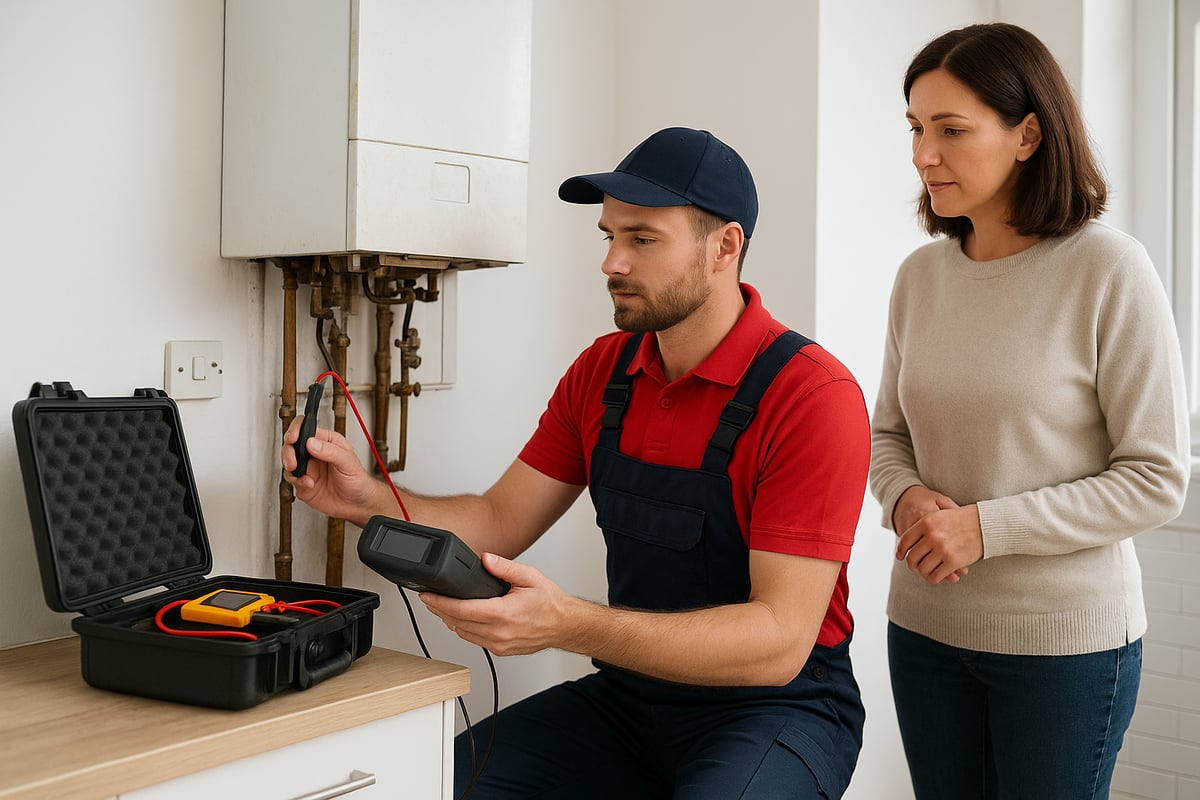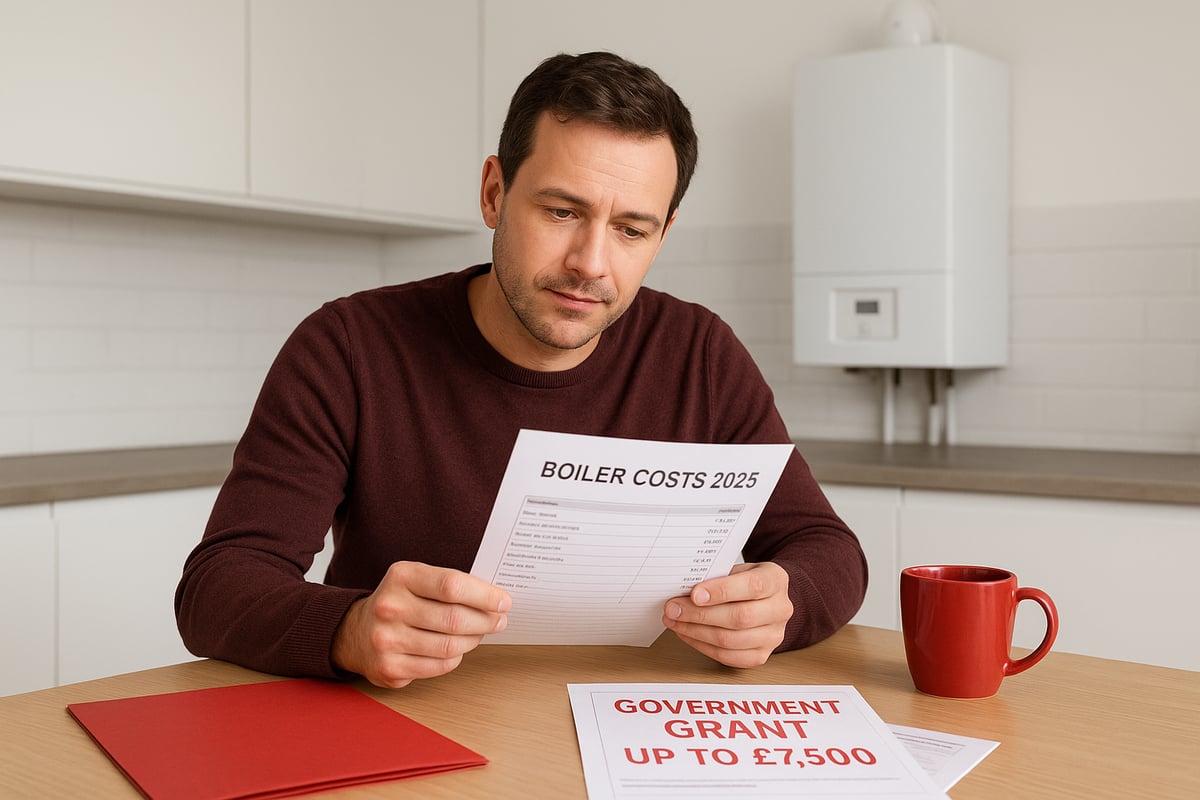New Boiler Fitted Guide: Your Essential Handbook 2025
Is 2025 the year you finally get a new boiler fitted? With energy costs rising and regulations evolving, there’s never been a better time to invest in comfort and efficiency. This essential handbook will guide you through every step, from assessing your needs to understanding installation and ongoing care. You’ll learn how to choose the right system, prepare for fitting, and navigate new standards with confidence. Discover how a new boiler fitted can save you money, boost reliability, and future-proof your home. Ready to upgrade? Let’s get started on your journey to a warmer, smarter home.
Assessing Your Boiler Needs in 2025
Choosing to have a new boiler fitted is a major decision for any homeowner, especially as we move into 2025. Understanding your exact requirements is crucial to ensure safety, efficiency, and compliance with the latest standards. Below, we guide you through the essential steps to assess your boiler needs before making an investment.

Understanding the Signs You Need a New Boiler
Knowing when it is time for a new boiler fitted starts with recognising common warning signs. If your current boiler is over 10 to 15 years old, it may be less efficient and prone to frequent breakdowns.
Rising energy bills, persistent noises, and uneven heating are all signals that your system may be failing. Safety is paramount; leaks or unexplained carbon monoxide alarms indicate an urgent need for replacement.
For example, a homeowner with a 12-year-old boiler might face escalating repair costs and unreliable heating, making the decision for a new boiler fitted both practical and necessary.
Evaluating Your Home’s Heating Requirements
Every property is unique, so choosing a new boiler fitted should reflect your home’s specific needs. Factors to consider include the size of your home, the quality of insulation, the number of bathrooms, and your household's hot water demand.
A 3-bedroom semi-detached house may require a different boiler capacity compared to a 5-bedroom detached home. Accurate heat loss calculations are vital to avoid under- or over-sizing your system, which can lead to inefficiency and wasted energy.
Consulting a professional ensures your new boiler fitted is tailored to your home, maximising comfort and performance.
Compliance with 2025 Regulations and Standards
Having a new boiler fitted in 2025 means following strict regulations. The UK has introduced higher efficiency standards, with all new gas boilers required to achieve at least 92% efficiency and be hydrogen-ready.
Installations must also align with the Future Homes Standard, which encourages the adoption of low-carbon technologies. These changes impact your options and long-term running costs.
For more details on the specific rules and requirements, see the UK's 2025 Boiler Efficiency Standards. Staying compliant ensures your new boiler fitted is future-proof and environmentally responsible.
Environmental Considerations and Energy Efficiency
Upgrading to a new boiler fitted brings significant environmental and financial benefits. Modern boilers reduce your carbon footprint and can lower your energy bills.
When selecting a model, check the energy label rating, which ranges from A (most efficient) to G (least efficient). For example, replacing a G-rated unit with an A-rated boiler can save hundreds of pounds annually on energy costs.
Choosing an efficient new boiler fitted supports both your household and the planet by reducing waste and emissions.
Budgeting and Long-Term Cost Considerations
The cost of getting a new boiler fitted varies depending on the type, size, and complexity of the installation. While upfront prices can range from £2,000 to £5,000, considering lifetime running costs is essential.
Government grants and eco-friendly schemes may help offset some expenses, making a high-efficiency new boiler fitted more accessible. Always compare quotes and check for hidden costs to make an informed, cost-effective choice.
A well-chosen new boiler fitted is an investment in your home’s comfort, safety, and long-term savings.
Choosing the Right Boiler for Your Home
Upgrading your heating system is a significant investment, and choosing the right boiler is essential for comfort, efficiency, and long-term savings. The process of getting a new boiler fitted in 2025 involves understanding the different types, fuels, features, and brands available. Below, we break down the key considerations to help you make an informed decision for your property.

Types of Boilers Explained: Combi, System, and Regular
The first step towards a new boiler fitted is understanding the main types available. Combi boilers are compact, providing instant hot water and heating without the need for tanks, making them ideal for flats and small homes.
System boilers require a cylinder for hot water storage, offering high flow rates—suitable for larger households with multiple bathrooms. Regular boilers, also called conventional boilers, use both a cylinder and a tank, working best in homes with traditional heating systems or low water pressure.
| Boiler Type | Pros | Cons | Ideal For |
|---|---|---|---|
| Combi | Space-saving, instant hot water | Limited simultaneous hot water supply | Flats, small houses |
| System | Good for high demand, no loft tank | Needs cylinder, more space | Larger families |
| Regular | Works with older systems, low pressure | Space for tank and cylinder needed | Traditional setups |
Selecting the right type is crucial for a new boiler fitted to your home’s needs.
Fuel Options in 2025: Gas, Electric, Oil, and Alternatives
When planning for a new boiler fitted, it’s vital to consider available fuel types. Gas remains the most common in the UK, offering efficient and cost-effective heating. However, electric boilers are gaining popularity, especially in properties without a gas connection, although running costs may be higher.
Oil boilers are used in rural or off-grid homes, but they require regular fuel deliveries. In 2025, hydrogen-ready and hybrid boilers are emerging, allowing homeowners to future-proof their investment as the UK shifts towards greener heating. Off-grid solutions such as LPG or biomass may also suit some properties.
Assessing your fuel options ensures that your new boiler fitted aligns with both your property and future regulations.
Sizing Your Boiler Correctly
One of the most important aspects of getting a new boiler fitted is choosing the correct size. A professional heat loss assessment considers your home’s insulation, size, and hot water demand to recommend the right output.
Oversizing a boiler can lead to wasted energy and higher bills, while an undersized boiler will struggle to heat your home efficiently. For example, a three-bedroom semi might need a 24kW combi, but a five-bedroom detached home could require a 35kW system boiler.
Accurate sizing guarantees that your new boiler fitted delivers optimal performance and comfort without unnecessary expense.
Smart Controls and Modern Features
Modern heating systems offer advanced controls that enhance the value of a new boiler fitted. Smart thermostats allow you to adjust temperatures remotely, set schedules, and even learn your routines for maximum efficiency.
Zoning enables different areas of your home to be heated independently, reducing wasted energy. Features like wireless connectivity and energy usage monitoring provide valuable insight into your consumption patterns.
Investing in these technologies when having a new boiler fitted can result in significant savings and a more comfortable living environment.
Comparing Top Boiler Brands and Models
When selecting a new boiler fitted, brand reputation and model reliability matter. Leading manufacturers such as Worcester Bosch, Vaillant, and Ideal consistently receive high marks for efficiency and customer satisfaction.
Key factors to compare include warranty length, parts availability, and after-sales service. Consumer Reports and independent surveys often rank Worcester Bosch and Vaillant highly for reliability and performance. For example, some models offer up to 12 years of warranty, giving peace of mind.
Choosing a reputable brand ensures your new boiler fitted will stand the test of time.
Warranties, Aftercare, and Support
Securing a strong warranty is a critical part of having a new boiler fitted. In 2025, standard warranty periods range from five to twelve years, often covering parts and labour for manufacturing faults.
Aftercare services, such as annual servicing, help maintain efficiency and keep your warranty valid. Most warranties exclude damage from limescale or sludge, so regular maintenance is key.
Understanding the terms and support options for your new boiler fitted will protect your investment and ensure trouble-free operation for years to come.
The Boiler Fitting Process: Step-by-Step
Replacing your heating system is a significant investment, so understanding the process of getting a new boiler fitted is essential. This section outlines each stage, helping you know what to expect and how to prepare for a seamless upgrade. Every step, from the initial survey to the final handover, is critical for safety, efficiency, and long-term satisfaction.

Pre-Installation Survey and Planning
Before having a new boiler fitted, a qualified engineer will visit your property for a pre-installation survey. This step ensures your home’s pipework, flue, and electrical systems are compatible with the new boiler. The engineer will assess your current setup, check for issues like asbestos or outdated wiring, and recommend any necessary upgrades.
During the survey, details such as the boiler’s location, access points, and ventilation requirements are reviewed. For example, if your old wiring is not up to current standards, this will need addressing before installation. The survey is also a chance to discuss any specific needs or preferences you may have.
For a detailed breakdown of each stage, see this step-by-step boiler installation guide.
Preparing Your Home for Installation
Preparation is key to a smooth new boiler fitted process. Clear the area where the boiler will be installed, removing furniture, valuables, and any obstructions. Protect your floors and furnishings with dust sheets, and ensure there is clear access from the entrance to the installation site.
Arranging for children and pets to be safely out of the way will help engineers work efficiently. If access is needed to lofts or airing cupboards, make sure these are tidy and accessible. Taking these steps minimises disruption and ensures installation can proceed without delays.
Removal of the Old Boiler
When it’s time to have your new boiler fitted, the first practical step is removing the old unit. Engineers will follow strict safety protocols, disconnecting the boiler from gas, water, and electricity. Any hazardous materials, such as asbestos, must be handled and disposed of in line with environmental regulations.
Old boilers are often recycled, with components separated for safe disposal. Proper removal reduces environmental impact and prevents future safety risks. For example, older boilers containing harmful substances are processed at approved facilities to meet UK standards.
Installation of the New Boiler
Once the old system is out, the installation of your new boiler fitted begins. This usually takes between one and three days, depending on the complexity. The engineer will mount the new unit, connect it to your heating and hot water systems, and ensure all pipework and controls are correctly configured.
Complex installations, such as upgrading from a regular to a combi system, may involve additional tasks like new flue installation or rerouting pipes. Throughout the process, the engineer will keep you informed and answer any questions you may have.
System Flushing and Water Treatment
After your new boiler fitted is in place, the engineer will flush your heating system. Powerflushing removes sludge, rust, and debris that could harm your new equipment. This step is vital for performance and longevity, as blockages can cause cold spots in radiators and reduce efficiency.
Once the system is clean, inhibitors are added to protect against future corrosion and limescale. For example, a thorough powerflush can dramatically improve radiator heat output, ensuring your new boiler operates at peak efficiency.
Testing, Commissioning, and Handover
With your new boiler fitted and system treated, the next stage is comprehensive testing and commissioning. The engineer will perform safety checks, test efficiency, and ensure all controls function correctly. You’ll receive a Building Regulations certificate and documentation for your records.
A proper handover includes a demonstration of the new controls, advice on settings, and guidance for future maintenance. This is your opportunity to ask questions and ensure you are confident using your boiler.
What to Expect on Installation Day
On installation day, expect a team of engineers to arrive promptly and keep you updated throughout. The process of getting a new boiler fitted can be disruptive, but clear communication and preparation help minimise inconvenience. Work typically begins in the morning and may last from several hours to a couple of days.
A typical schedule includes removal of the old boiler, system flushing, installation, testing, and a final walkthrough. By the end of the day, you’ll have a fully operational heating system and a clear understanding of how to use it.
Costs, Grants, and Financing Options for 2025
Investing in a new boiler fitted in 2025 means understanding the full range of costs, grants, and payment options available. With evolving technology and regulations, budgeting wisely ensures you get comfort and efficiency without financial strain.

Boiler Installation Costs Breakdown
The cost of a new boiler fitted in 2025 can range from £2,000 to £5,000, depending on the type, brand, and complexity of installation. Combi boilers are usually more affordable, while system and regular boilers can cost more due to extra components.
Factors influencing price include your location, the need for system upgrades, and the brand chosen. For a clear overview, see the Cost of boiler and installation explained guide.
| Boiler Type | Average Price (2025) | Typical Installation Time |
|---|---|---|
| Combi | £2,000–£3,000 | 1 day |
| System | £2,500–£4,000 | 1–2 days |
| Regular | £3,000–£5,000 | 2–3 days |
When comparing, remember the initial investment for a new boiler fitted is only part of the total cost. Ongoing efficiency and reliability can save you money over time.
Available Government Grants and Incentives
Securing a new boiler fitted in 2025 is more affordable thanks to several UK government schemes. The Boiler Upgrade Scheme and ECO4 provide grants for eco-friendly installations, especially for low-income or energy-inefficient homes.
Eligibility often depends on your property’s EPC rating, income level, and the type of system being installed. Some local councils offer additional support. A case study shows a family saving £1,000 on their new boiler fitted by combining grants.
Applying is straightforward. Check eligibility, gather documentation, and apply via the scheme’s website or through your installer. Timely applications maximise your chances of securing funding for your new boiler fitted.
Financing and Payment Plans
If covering the cost of a new boiler fitted upfront is not feasible, many providers now offer flexible financing. Interest-free credit or pay-monthly options spread the cost over 12 to 60 months, making upgrades accessible for more households.
Consider the pros and cons: finance eases cash flow but may include arrangement fees or higher total costs. A typical 2025 repayment plan for a new boiler fitted could be £60–£90 per month over three years.
Before signing up, compare payment options, check for hidden charges, and ensure the agreement suits your budget. Financing can make a new boiler fitted achievable without straining your finances.
Hidden Costs and How to Avoid Them
When arranging a new boiler fitted, it is vital to anticipate potential extra expenses. Common hidden costs include pipework upgrades, flue extensions, and old boiler disposal fees. Some homes may also need electrical work or system flushing.
To avoid surprises, request itemised quotes and ask installers about all possible additional charges. Use a checklist:
- Are pipework upgrades included?
- Is the disposal of the old boiler covered?
- Are flue or vent changes needed?
- Will there be extra costs for water treatment?
A detailed quote ensures your new boiler fitted project stays within budget and prevents unexpected bills.
Maintaining Your New Boiler for Peak Performance
Keeping your new boiler fitted in top condition is essential for comfort, safety, and long-term savings. Regular maintenance ensures your system runs efficiently, minimises breakdowns, and protects your investment. Let us explore the key steps to maintain peak performance throughout your boiler’s lifespan.
Annual Servicing and Why It Matters
Annual servicing is the cornerstone of keeping your new boiler fitted running smoothly. A yearly check by a Gas Safe registered engineer will maintain efficiency, identify potential issues early, and keep your warranty valid. Servicing typically includes a safety inspection, cleaning key components, and checking for leaks or wear.
Neglecting this step can lead to costly breakdowns and may even void your manufacturer warranty. Many homeowners have avoided unexpected repair bills simply by scheduling regular maintenance. For a detailed overview of what is involved, visit Annual boiler servicing importance.
Troubleshooting Common Issues
After a new boiler fitted, minor teething problems can sometimes occur. Common issues include pressure drops, cold spots in radiators, or occasional error codes. Often, these are easy to fix with simple checks, such as topping up system pressure or bleeding radiators.
Use this quick reference table for troubleshooting:
| Issue | Likely Cause | Solution |
|---|---|---|
| Low pressure | Leak or bleeding | Re-pressurise system |
| Cold radiators | Airlocks/sludge | Bleed/powerflush |
| Error codes | Sensor/fault | Consult manual/call engineer |
If in doubt, always consult your installer, especially if your new boiler fitted displays persistent warnings.
Maximising Efficiency and Reducing Bills
With a new boiler fitted, small changes to your routine can yield significant savings. Regularly bleed your radiators to eliminate air pockets and ensure even heat distribution. Adjust your controls based on occupancy and external temperatures to avoid wasted energy.
Smart thermostats and zoning can further optimise your heating schedule. Routine checks for leaks or unusual noises also help maintain peak performance. Over the course of a year, these habits can reduce bills and maximise the return on your investment in a new boiler fitted.
Understanding Your Boiler’s Warranty and Support
Registering your warranty as soon as your new boiler fitted is complete is vital. Most manufacturers require registration within 30 days. Keep all documentation safe, as it will be needed if you encounter a fault.
If problems arise, contact your installer or manufacturer promptly. Warranty support often covers parts and labour for specific issues but may exclude damage from lack of maintenance. Knowing what your new boiler fitted warranty includes will ensure you get the help you need quickly and efficiently.
Frequently Asked Questions About New Boiler Fitting
Thinking about getting a new boiler fitted in 2025? Homeowners often have plenty of questions before starting the process. Here, we answer the most common queries to guide you every step of the way.
How Long Does the Installation Take?
The time needed to have a new boiler fitted depends on the type of system and your home’s setup. Typically, a straightforward combi-to-combi swap takes one day. More complex installations, such as switching from a regular to a system boiler, or relocating the boiler, might take two to three days.
Factors affecting the duration include the condition of existing pipework, flue requirements, and whether extra upgrades are needed. For a detailed breakdown of what to expect, see this guide on how long does a boiler installation take.
If you need a new boiler fitted urgently, some installers offer fast-track services for emergencies.
Is Planning Permission Needed?
In most cases, you will not need planning permission to have a new boiler fitted. However, exceptions exist for listed buildings, conservation areas, or when the flue will be installed in a prominent location.
It is essential to comply with Building Regulations, which cover energy efficiency and safety standards. Always check with your local council if your property has any restrictions.
If you are unsure whether your new boiler fitted project requires permission, your installer can advise you and help ensure all legal requirements are met.
Can I Install a Boiler Myself?
It is illegal for anyone who is not Gas Safe registered to have a new boiler fitted themselves. DIY installation poses serious safety risks, including gas leaks and carbon monoxide poisoning, and can void your home insurance.
Fines for unregistered work can be substantial, and you might have to pay for a professional to correct any mistakes. Only a qualified engineer should handle a new boiler fitted, ensuring your safety and compliance with the law.
Always check your installer’s credentials before work begins.
What Should I Ask My Installer?
Before getting a new boiler fitted, prepare a list of key questions for your installer:
- What warranty and aftercare are included?
- How much experience do you have with my chosen boiler?
- Is your quote fully itemised?
- Can you provide references?
Request written confirmation of all details. A reputable installer will happily answer questions and provide clear documentation. This ensures your new boiler fitted is completed to the highest standard, with no surprises along the way.
After reading through this essential guide, you’re now equipped with the knowledge to confidently assess your boiler needs, understand the latest regulations, and make informed decisions for your home in 2025. Choosing the right boiler and trusted installer is crucial for long term comfort, safety, and energy savings. If you’re ready to take the next step towards a warmer, more efficient home, let the experienced team at Castle Heating Kent help. We specialise in keeping local homes warm and reliable with expert advice and Gas Safe registered engineers.
Keeping Homes in and around kent Warm, Dry & Flowing Book with castle heating kent

